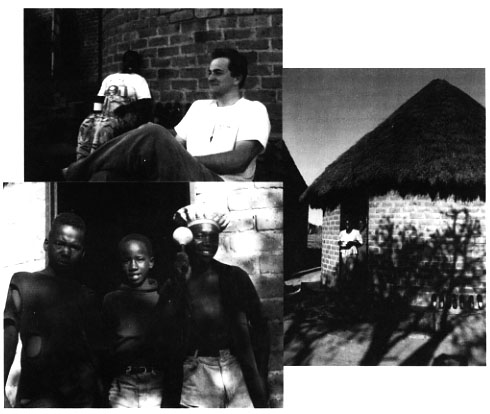
 became Tawedzera Dzangere for
three weeks in August and September. In Shona, the word
"tawedzera" means "we have increased," which is exactly what
happened to the Dzangare family while I was staying with them.
became Tawedzera Dzangere for
three weeks in August and September. In Shona, the word
"tawedzera" means "we have increased," which is exactly what
happened to the Dzangare family while I was staying with them.
The Dzangares live in Gweshe Village, part of the Chiweshe
Communal Lands in Mashonaland Central Province. Baba (Father)
Dzangare supports his family by fishing in a local man-made lake and
by cultivating small plots of cotton, maize and squash. Amai (Mother)
Dzangare spends her days cooking, cleaning, and taking care of the
children.
I was the Dzangare's third and youngest son. The eldest of my
host brothers was living in Harare, but the Dzangare's other son,
Warren, was still living at home, along with Amai Dzangare's younger
brother Evans and their cousin Innocent.
Culture shock both frustrates and entertains. Living in rural
Africa, I had to get used to entirely alien concepts of privacy,
gender relationships, and daily subsistence.
The most immediate and disorienting of these was the first -- the
complete lack of personal space. My host brothers would follow me to
the outhouse -- chimbuzi in Shona -- because they wanted to make sure I would be
safe. While I was away at school, a forty-five minute walk from the
Dzangare homestead, my host sisters would clean and organize my few
personal items. At night, I would cram into a small double bed with
two or three of my big host brothers.
After two weeks in Gweshe, I thought I had acclimated completely,
until, that is, my host brothers found the one letter that I had
received during my three weeks in the village. I ducked out to the
chimbuzi
for no more than two minutes, and when I returned to our hut, Evans
and Innocent were reading a personal letter that I had received from
my girlfriend.
At first, I was intensely angry, but I quickly gained my
composure and realized that my host brothers' intentions were not
malicious; they were just curious about what my girlfriend had to
say. At the end of her letter, my girlfriend wrote, "Don't forget to
teach me some Shona: 'Hello,' 'Goodbye,' 'Thank you,' 'Do you want to
do it doggy-style?' -- you know, just the basic vocabulary will
do."
My host brothers understood everything in the letter. Well,
almost everything: "Tawedzera, what's
'doggy-style?'" they asked.
"Well, brothers," I explained, "in my culture, if you read
someone else's mail, you must write to the person who wrote the
letter if you have any questions about it." Thus began a
correspondence between my girlfriend in Washington, D.C. and my host
brothers in a rural Zimbabwean village.
 On another
night, while I was complaining to my notebook about my lack of space,
I heard a loud ruckus brewing outside. I jumped up, grabbed my
flashlight and went to investigate.
On another
night, while I was complaining to my notebook about my lack of space,
I heard a loud ruckus brewing outside. I jumped up, grabbed my
flashlight and went to investigate.
Boys with sticks were prowling around the homestead, shouting for
flashlights and calling their dogs. I found Warren among the band of
boys.
"What the hell is going on?" I asked.
"They have trapped a pig in that field," he said, pointing to the
corral behind our hut.
"Well, let's go catch it," I said, running into the field with my
flashlight.
Warren started yelling at me, "Tawedzera, come back, come
back!"
"Why?" I shouted.
"Tawedzera, that's a wild pig, a njiri, not a domesticated
pig. It is a deadly animal," he explained.
Warren explained that some dogs had picked up the scent of the
njiri and
chased it towards the village. When some boys saw the animal, they
grabbed wooden clubs and other blunt weapons and went in pursuit.
"What are they going to do to it when they catch it?" I asked
Warren.
"They're going to kill it!" he replied.
Using the dogs and the blunt weapons, they planned to corner the
animal and beat it to death. Warren added that the animal would
probably be killed only after one or two of the boys had been injured
-- either by the animal's huge tusks or by another boy's poorly
wielded blunt weapon.
"And what will they do with it after they kill it?" I asked.
"They will divide up the meat and bring it back to their
mothers," Warren replied.
By this time, a huge growd had gathered at the homestead. The
boys were getting frantic and it appeared that the dogs had lost the
scent.
"What a shame," Warren said, "I think that the njiri has escaped."
"Good for the njiri," I said.
"No," said Warren, "we are sad when a njiri escapes because
njiri meat
is very tasty."
Warren looked after me for those entire three weeks. He even went
so far as to provide me with a woman on one of my last nights in the
village. In Shona culture, men must buy their wives for a hefty price
-- about ten cows or the cash equivalent. For this reason, to be
given a woman for free is a great honor indeed. Unfortunately, I
didn't realize what was happening until after I had missed my chance
to accept Warren's gift. A strange woman arrived at the homestead one
night and after she disappeared, Warren asked me why I had not
accepted her.
"What are you talking about?" I asked.
"I brought her here for you," he said.
A long conversation about gender politics in my culture ensued.
After about an hour, Warren understood that it would have been
inappropriate for me to accept his generous offer.
While I refused the proffered wife, I did manage to pick up
another equally memorable souvenir. To call this memento "foot
fungus" would be a serious understatement. One of the programme staff
called it "jungle rot," which seems more accurate. I cannot be
exactly sure where I contracted the jungle rot, but chances are that
it came from the chimbuzi. Naive American
that I am, I usually visited the chimbuzi with bare feet.
By my third week in the village, the jungle rot had ravaged the first
several layers of skin on the heel of my right foot. My foot looked
like ground zero after a missile strike.
The only thing worse than the severe tissue damage, however, was
the smell. I won't try to describe it. I tried to keep my foot clean
and dry, but my condition just got worse.
Through the programme, I eventually tracked down a doctor who
prescribed Nidrox, a powerful antifungal medication. The Nidrox
stopped the spread of the fungus but did not eliminate it. Two weeks
after I started taking the Nidrox, my prescription ran out and, since
I was not in Harare, I could not get it refilled. The fungus came
back with a vengeance. Eventually, however, it went away on its own.
Too bad -- now I have less to show from my trip.
[ BACK ]


![]() became Tawedzera Dzangere for
three weeks in August and September. In Shona, the word
"tawedzera" means "we have increased," which is exactly what
happened to the Dzangare family while I was staying with them.
became Tawedzera Dzangere for
three weeks in August and September. In Shona, the word
"tawedzera" means "we have increased," which is exactly what
happened to the Dzangare family while I was staying with them.
![]()